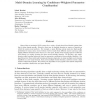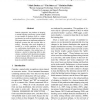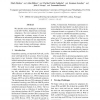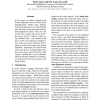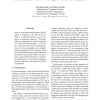138
click to vote
Publication
Road scene segmentation is important in computer vision for different applications such as autonomous driving and pedestrian detection. Recovering the 3D structure of road scenes ...
155
click to vote
ML
2010
ACM
14 years 9 months ago
2010
ACM
State-of-the-art statistical NLP systems for a variety of tasks learn from labeled training data that is often domain specific. However, there may be multiple domains or sources o...
147
click to vote
TNN
2011
14 years 9 months ago
2011
Domain adaptation solves a learning problem in a target domain by utilizing the training data in a different but related source domain. Intuitively, discovering a good feature rep...
115
click to vote
EMNLP
2010
15 years 3 days ago
2010
Domain adaptation, the problem of adapting a natural language processing system trained in one domain to perform well in a different domain, has received significant attention. Th...
PAMI
2010
15 years 15 days ago
2010
—This paper addresses pattern classification in the framework of domain adaptation by considering methods that solve problems in which training data are assumed to be available o...
122
click to vote
EMNLP
2008
15 years 3 months ago
2008
NLP tasks are often domain specific, yet systems can learn behaviors across multiple domains. We develop a new multi-domain online learning framework based on parameter combinatio...
109
click to vote
EMNLP
2007
15 years 3 months ago
2007
We describe some challenges of adaptation in the 2007 CoNLL Shared Task on Domain Adaptation. Our error analysis for this task suggests that a primary source of error is differenc...
108
click to vote
COLING
2008
15 years 3 months ago
2008
In this paper we explore robustness and domain adaptation issues for Word Sense Disambiguation (WSD) using Singular Value Decomposition (SVD) and unlabeled data. We focus on the s...
ACL
2007
15 years 3 months ago
2007
Domain adaptation is an important problem in natural language processing (NLP) due to the lack of labeled data in novel domains. In this paper, we study the domain adaptation prob...
136
click to vote
ACL
2007
15 years 3 months ago
2007
When a word sense disambiguation (WSD) system is trained on one domain but applied to a different domain, a drop in accuracy is frequently observed. This highlights the importance...

